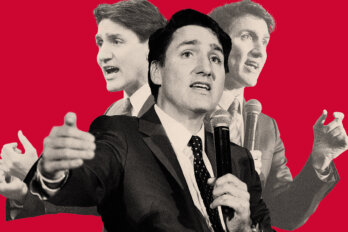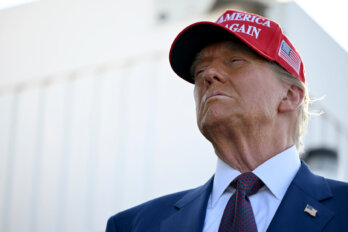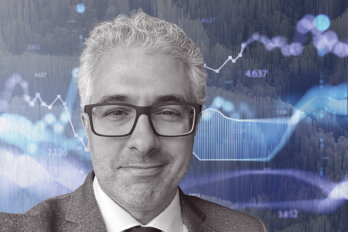The weekend-long Festival of Hope, an arena-sized rally in downtown Vancouver for western Canadian evangelicals, attracts tens of thousands. Old men in buffed cowboy boots push wheelchairs with even older occupants. Carefully dressed couples, whose appearances suggests date night rather than religious revival, hold hands and stroll into the arena alongside teenage punks in skateboard clothes and tall, loping youth in basketball gear. The crowd streams past the sidewalk where I stand with my homemade protest sign, and on toward the hockey arena where controversial preacher Franklin Graham is set to speak.
Franklin Graham, the son of American Evangelist Billy Graham, looks like his father and carries the same facial features, but with a furrowed brow and clenched jaw—fitting metaphors for the direction he has taken the family brand of American evangelism. He wields his words like Samson wielded the jawbone of the donkey in the Book of Judges: directed at people he considers enemies, inside and outside the church. In December of 2015, while Donald Trump was still competing for the Republican primary, Graham supported Trump’s proposal for an immigration ban; when Trump became president, Graham prayed at the inauguration, stating that the rain was a sign of God’s favour. When asked about a conservative Christian family who welcomed gay kids into their home and church, Graham grew particularly concerned: “They are not going to influence those kids, those kids are going to influence this parent’s children . . . . We think we can fight by smiling, and being real nice and loving, we have to understand who the enemy is.”
A large coalition of Vancouver churches (including mine, Grandview Calvary Baptist) as well as Mayor Gregor Robertson and several city councillors, asked the festival organizers to reconsider Graham’s participation in the event. The organizers didn’t reconsider. Graham was coming to Canada, protest be damned. So Streams of Justice, a grassroots collective of Vancouverites—some identifying as Christian, some not—organized a protest.
There are roughly thirty of us distributing pamphlets and holding signs that say things like Jesus was a Refugee and Love Your LGBTQ Neighbour. Among us: two female ministers (United Church and Baptist), a middle-aged man who heard about the event through Facebook, older men with white beards, limber twenty-somethings, a young family with two small children, a non-binary single parent with a young child. I’m holding a sign I made earlier in the afternoon: Veterans Against Graham’s Islamophobia. I’ve sharpied the iconic Christian fish in the corner of the sign, along with a speech bubble that reads Love Your Neighbor. I get a few half-smiles but mostly confused looks and incredulous frowns. As a veteran of the war in Afghanistan and a follower of Jesus who wants the Christian narrative to change from one of violence and exclusion to one of peace and tolerance, I’m a bit of an anomaly to some of the attendees. They slow while reading my sign. Their faces contort, as if to say: Should I thank you for your service, for going to war as a Canadian soldier, or should I berate you for your dangerously pacifist beliefs?
I assumed the brand of evangelicalism that Graham supports is the domain of white conservatives. At this conference, however, many of the people in attendance don’t fit my expectations, just as I don’t fit theirs, as a veteran of Afghanistan and a protester. The attendees flocking to hear Graham are young and old, Canadians with cultures and experiences different than my own; probably half of the people are Asian and black. Everyone in attendance has their own reason for being here this weekend, and I’m no different: I’m here because of the recent Quebec Mosque shooting, because of the ways that alienation and stigmatization contribute to queer youth suicides, because I think that Franklin Graham’s rhetoric puts people in danger.
Growing up, I spent more time wondering about the state of my personal salvation and less about the needs of the people living in my neighbourhood. As a child, I lived within walking distance of the Charles Camsell Hospital, a tuberculosis sanitorium where many Indigenous people died. I had no idea what the building was. Today, I live on unceded Coast Salish land, and I continue to see the suffering inflicted by the settler-colonial way of life. For many years, my personal faith did not acknowledge these uncomfortable realities.
On certain days I still smell the interior of the Fraise Chapel on Kandahar Airfield, the hushed dustiness and snuffed candles of the church in the middle of the desert. I hear the worship music—evangelical tunes strummed on acoustic guitar, ‘90s staples like “Our God is an Awesome God,” “We Want to See Jesus Lifted Up,” “Shine Jesus Shine.” The interior of the chapel is unfinished. A gun rack stands vigil at the entrance, lined with rifles as varied as the coalition forces inhabiting the base. Up at the front, the American chaplain stands erect, has a high and tight haircut, speaks with his hands and prays with a drawl, drawing out the length and heft of each word. The attendees stand when we are told, sing when the music starts and sit when the chaplain holds his hand to the ground. He reads from the Bible and preaches about faithfulness in times of war. An AC unit is tacked to the side of the yellow building like a piece of lego.
Concrete blast walls are somewhere close, though I can no longer remember where. In the distance, helicopters and planes land and depart, lifting supplies and soldiers through hot air, helicopters winging the distance over Kandahar, the Arghandab, nameless wadis and named villages, toward Forward Operating Bases where soldiers sleep on thermarests, play cards, burn shit in drum barrels, wait for and write letters, walk out of the base and into villages on patrol, firing their rifles and being fired at themselves. I’ll eventually find myself in a few of these Forward Operating Bases, firing my own rifle, but today I’m in church, sitting on a makeshift pew, holding the hymnal in my hand. The chaplain prays for bravery, and I’m praying too. God feels very far away. I can’t find him in the hymnal here.
I joined the military at the age of sixteen, following in the family tradition. I didn’t spend much time thinking about why I was joining—whether I even should. Joining the army felt like one of life’s natural progressions, like getting married, having a child. I idolized older soldiers, particularly those who had been to war. I wanted to be like them. In the twelfth grade I brought my dress uniform to school for Remembrance Day. Right before the ceremony was set to begin, I ran into one of the empty classrooms and changed from my school clothes into my uniform. Even the punk kids were impressed by the sudden transformation. I walked up to the front and read John McCrae’s famous poem, pausing to scan the crowd. The students, at least in my memory, looked impressed; the teachers, with the exception of the one who asked me to read, looked sad, as though they knew something I didn’t. Many of them were old enough to remember Vietnam. I remember being confused as to why they weren’t happy for me.
Before the war, I didn’t really know any Muslim people. If they were Muslim, they had either stopped practicing or kept their faith quiet around me, afraid of the consequences in post-9/11 Canada. In Afghanistan, where I was the minority, where the call to prayer rang as a voice from a minaret instead of a bell from a steeple, I was forced to question my religious upbringing in relation to a world that was larger than my own. The evangelical doctrine of being “saved” felt like an entirely inadequate response to the suffering that was so visibly a part of everyday life in southern Afghanistan. When I watched Canadians and Afghans die on a quiet stretch of Kandahar highway, my religious ideologies started to die too, a process that continued long after I returned to Canada. Back home, I no longer supported the mission, no longer believed in any form of religion that sought to resolve conflict with violence.
Many years after I left the military, I began practicing faith again, though it didn’t look much like the faith I’d left after Afghanistan. I wanted to believe in a way of living that sought to lessen suffering, rather than enforce ideology. My new understanding of faith also forced me to admit complicity in colonialism, in the attempted genocide of Indigenous people, in the modern day imperialism of wars in the Middle East, wars that have not, in any way, made the world safer. To me it seemed clear—and still does—that our personal ideologies are inseparable from political realities: bombs, vets with PTSD, refugees, and residential schools are reflections of the ways we’ve failed one another, religiously and otherwise. But once we acknowledge these failures, how do we respond? In our increasingly polarized political discourse, it’s difficult to remember that people remain more complex than some of our expectations, or even interactions, suggest. How do we recognize and respect this complexity while not remaining silent about actions and systems that we think perpetuate oppression and injustice? How do we keep talking in spite of difference?
Most of the festival-goers avert their eyes and keep walking. Some pick up the leaflets and throw them in the garbage a few feet later. Those who can’t be bothered to find a garbage throw the pamphlets on the cold concrete. Others, however, ask to take photos with the Love Your Muslim Neighbour sign and engage in friendly discussion. Some people aren’t aware of the things Graham has said and are visibly upset.
“Why are you here?” one attendee asks me, angrily. I tell her about the recent Mosque shooting in Quebec, how Christians need to hold their leaders accountable for saying things that stir anger and incite violence. “Whatever,” she says, walking away.
I have the same conversation with another woman who promises to Google Graham and look at the things he’s said about Muslims.
People pass by who are not here for the event too. “What’s happening?” one asks, walking with a group of young men.
“We’re here to protest Franklin Graham’s presence at the festival and the things he’s said about Muslims,” a protester explains.
“Thank you,” he says. One man adds, “I’m Muslim.
“Thank you for your service,” one teenager in a ball-cap says. He follows me for a bit, possibly excited by the idea of war, proximity to a veteran. I can sympathize. In a different life I was the young man, excited by the idea of war, politically and religiously conservative. At my high school graduation, the night of the 2004 Canadian Federal Election, I walked up the microphone and predicted a Conservative majority while my social studies teacher flushed with frustration. The young man and I talk for a bit about my time in Afghanistan, and I explain why I’m protesting. We shake hands and he retreats back to the arena.
Most of the people going to Graham’s conference don’t want to talk about politics, don’t want to talk at all. Many assume we are atheists, here to berate them for their religious beliefs. We try to explain that Graham is a poor ambassador of Jesus, who was killed by the state for conversing with outcasts and speaking against corruption and hypocrisy. Some nod; some shrug; some become angry. “You talk about diversity,” one attendee tells a protester. “Look at the people in line. That is diversity.” And in some ways she is right. Many of the protesters are white, educated, middle-class. The crowd flowing into the arena represents Canada’s racial and cultural diversity: the protesters outside do not. As a white, heterosexual male, I obviously do not represent that diversity, even if I try to make space for it.
After the war, I met former Guantanamo detainee Omar Khadr. Over the course of a few years, we have slowly become friends. In August of 2016, he stayed in my home in Vancouver. I’m friends with Omar not because he is Muslim, but because he is trying to figure out how to live well in this world, as I am. Once, we would have been enemies. Now we are walking in a similar direction. And there are other signs of hope. While I disagree with the Catholic Church’s position on a number of issues, Pope Francis’s call for dialogue among different faiths and advocacy for Muslims displaced by war is a welcome sign in a world that needs reconciliation as much as it needs water.
Outside of the arena, the sun has gone down on our second night of protesting. We pack up our signs and backpacks and strollers and head to the Metro, where we watch the glowing Vancouver skyline on the ride home. I’m glad to have participated in the protest, even as I recognize the need to question my own assumptions about the intersections between race, religious belief, and politics—who we listen to and how—even as I recognize that a protest is small, that the dilemmas our world faces are large and complicated. But a protest is one of many entry points into a larger conversation, and the issues Franklin Graham evokes aren’t going away anytime soon.
At the Quebec mosque where six Muslims were killed in January, a slashed Qu’ran arrived in the mail just last month. Similarly, the reaction to the Omar Khadr settlement has revealed a deep division, where many Canadians are angry over a settlement involving a fifteen year old who got caught up in a war he did not choose, while others view the settlement as a defence of Canadian rights and freedoms. People like Franklin Graham are happy to exploit such dichotomies and stoke discontent, announcing his displeasure at the Omar Khadr settlement to his nearly six million Facebook followers. My Facebook feed is another tale of two solitudes, where angry, violent words come from people on both sides of the political spectrum—and I sometimes get caught in the binaries. In a digital world, the question, “Who is my neighbour?” is easily forgotten. Yet if there is any change, it is that we have more neighbours now than ever before: the scope of the question is broadened, but the tone of the conversation has diminished.
Jesus was once asked this same question. He responded with a call for mercy that transcended the social structures of his age and the practises of the religious establishment. I’m inspired by that call. Someone once asked me if I’d want Omar as a neighbour, if I would trust him. My answer remains yes. But it’s not about offering mercy. On the contrary, it’s about us learning to live well together, to look inside and examine the ways that our faith traditions or personal actions have caused harm or participated in violence. For me, the protest confirmed the need to speak in public places and in peaceful solidarity, to talk and to listen. I want to love my Muslim neighbours better. I want to love all my neighbours better.





